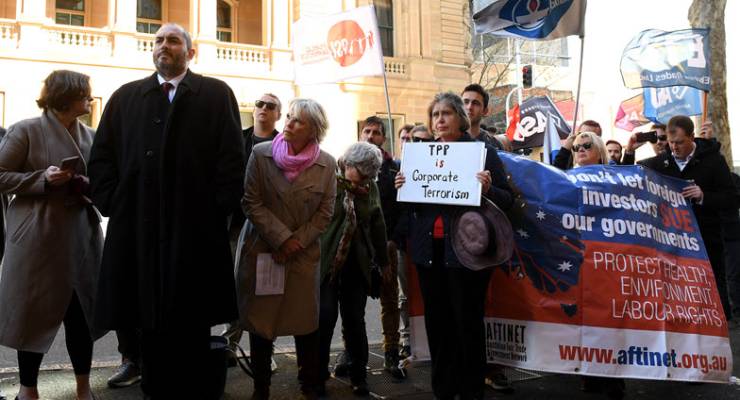
In a co-ordinated push with The Australian, the government has embarked on an attempt to revive the Trans-Pacific Partnership trade agreement and burnish its free-trade credentials.
Later this week, the “TPP 11” — the TPP signatories minus the United States — will meet in Vietnam ahead of the APEC leaders’ summit to try to agree on a new deal in the wake of Donald Trump killing off US participation. Malcolm Turnbull, backed by Japan, wants to keep the TPP 11 just the way it was when the US was involved, in the hope that a post-Trump administration will want to join in. Other participants are rather less keen on that idea, including our neighbours across the Tasman.
The push to revive the TPP was the subject of an editorial in the Oz, one of Paul Kelly’s godawful boring op-eds and a dropped report about specially commissioned modelling by DFAT on the economic benefits of free trade. Clearly it’s a subject close to the Prime Minister’s heart.
Inconveniently, however, just a few days ago, the US Trade Representative spelled out why countries should ditch one of the most controversial and hotly disputed elements of the TPP, its provisions for investor-state dispute settlement (ISDS). Those are the provisions that give multinationals the right to sue governments for any policy changes that might affect them, in pro-corporate, non-legal international arbitration forums. At a post-NAFTA renegotiation meeting press conference on 18 October, US Trade Rep Robert Lighthizer lashed out at ISDS:
“It’s always odd to me when the business people come around and say, ‘Oh, we just want our investments protected.’ … I mean, don’t we all? I would love to have my investments guaranteed. But unfortunately, it doesn’t work that way in the market. … I’ve had people come in and say, literally, to me: ‘Oh, but you can’t do this: you can’t change ISDS. … You can’t do that because we wouldn’t have made the investment otherwise.’ I’m thinking, ‘Well, then why is it a good policy of the United States government to encourage investment in Mexico?’ … The bottom line is, business says: ‘We want to make decisions and have markets decide. But! We would like to have political risk insurance paid for by the United States’ government.’ And to me that’s absurd. You either are in the market, or you’re not in the market.”
In case you’re thinking this is just some Trumpian eccentricity, earlier this year, the Financial Times editorialised against ISDS; two weeks ago, more than 200 law and economics professors wrote to Trump calling for ISDS to be removed from NAFTA; even a senior member of the libertarian Cato Institute called for the removal of ISDS. Yesterday in her media conference with Malcolm Turnbull, Jacinda Ardern repeated something she’s been saying for a while: New Zealand wants the ISDS provisions significantly renegotiated in the TPP 11:
“We continue to advocate strongly around ISDS causes, something I made very clear domestically and something I think the population would want us to pursue, to ensure we are protecting New Zealand’s domestic best interests. At the same time we’ve also said we want to pursue the best interests of our exporters. There’s no denying the TPP provides distinct opportunities, particularly in the arrangement with Japan. But at this stage, that will not stop us from pursuing the ISDS clauses as far as we are able.”
That leaves Turnbull virtually alone in wanting to open up his country to litigation by multinationals against policy decisions in the national interest.








I’m shocked the government wants to give handouts to business, shocked!
I am also totally shocked. Who would have thought the Coalition would ever do anything to help out those poor struggling businesses.
You forget that Mr Turnbull and others of his ilk will one day go back to the businesses they left and this may possibly provide a huge windfall. Future governments will obviously think twice about annoying business just in case they are sued. Mr. Turnbull think again, you are a disgraceful leader of your government and this country.
You could only want international corporations to be able to sue sovereign governments over matters of sovereign legislation if you (a) worked for those international corporations at a high level and (b) foresaw a time coming when governments might be elected who wanted to protect their people against the depredations of those international corporations.
Spot on Rais, I can only repeat a comment I made on another article – what a stark contrast we see – NZ has a Leader, we have a Scumbag.
This agreement will mean the death of our Sovereign Rights. Honouring ISDS should be regarded as treason.
Australian successfully defended its legislation establishing the plain packaging of cigarettes against an action similar to what would be available under ISDS clauses. It cost $50 million – at least that was the last figure published. Trumble’s barrister mates must be salivating at the thought of more similar actions for them to defend. Lawyers unite!!
Malcolm Turdbull: corporate shill, Australian traitor.